Publishing Scam
Writing a book? You have a desire to see it published as soon as possible? There are huge bunch of publishing companies out there who are waiting to publish your books by charging you publishing fees.
Authors beware! Publishing scams are another name of self publishing schemes. It is another big profit making scam strategy of scammers. They pretend to publish your book and the victim is ultimately made to pretend to be the author. Publishing scams are popular from olden days when users wrote books, and hunted for legitimate publishers. Scammers took advantage of this and brought in their scam tricks in publishing services. The author is made the subject upon which scammers experiment their strategies in order to mint money out of the victim's pockets.
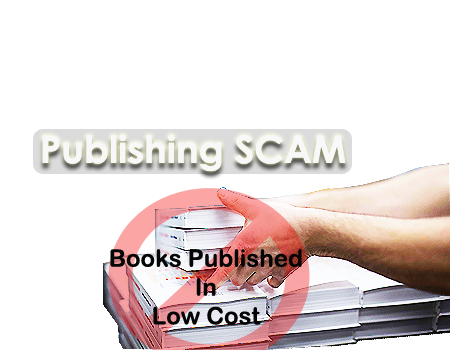
With the advancement in technology, many scammers are running legitimate websites for online publishing services. Scammers charge money for publishing books, research works, articles and notes online. They pretend to be international publishing services with reputed brand names and charge a minimal fee from the huge number of users for publishing their material.
A publishing scam preys on aspiring authors by promising publication services while deceptively extracting money without delivering on commitments. Scammers often make unrealistic assurances of literary success or bestseller status to lure writers. One common tactic involves charging substantial upfront fees for editing, marketing, or distribution services, often resulting in poor-quality or nonexistent deliverables. Some scams may exploit authors by demanding excessive rights to their work or impersonating literary agents who charge upfront fees. Vanity presses, associated with publishing scams, convince authors to pay for publication without undergoing a genuine selection process. To protect against publishing scams, aspiring authors should thoroughly research publishing services, avoid significant upfront fees, understand contract terms, verify literary agents' credentials, and seek advice from reputable authors' organizations. Awareness and skepticism play crucial roles in avoiding the financial pitfalls of publishing scams.
How scammers target victims for publishing scams?
The old and most popularly used medium to target victims for scam is via emails. The Emails appear to be a personal message in the user's inbox. Scammers are so efficient in framing legitimate emails, which lure the reader. Below is an example of a publishing service email sent out to prospective email addresses, advertising scam publishing services.
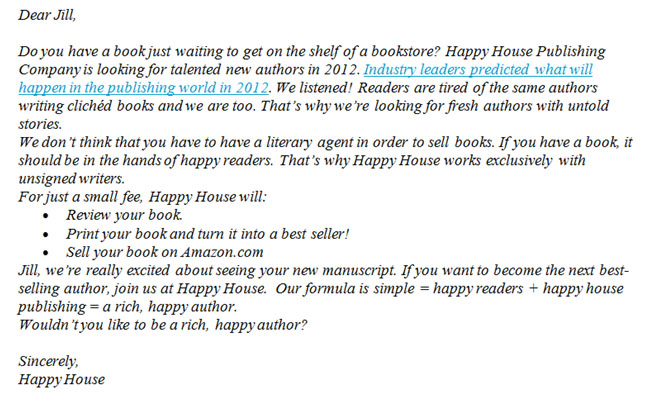
Any user who is in search of a publishing house will consider the above sent email as an opportunity. No user who receives such a mail will ever imagine that they will be the next scam victim for the scammer. Every year there are thousands of authors who believe such emails and fall prey to publishing scams.
Most of the publishing scam services promise you the listing of your book on great online platforms such as Amazon. They charge you an extra fee in the name of "publishing fees" reading fees" and so on.
Scammers employ cunning tactics to target victims in publishing scams, preying on the aspirations of hopeful authors. They often start by making extravagant promises of literary success, bestseller status, or guaranteed publication, creating an enticing illusion. Impersonating reputable literary agents or publishers, scammers build trust and legitimacy. One common strategy involves demanding substantial upfront fees for services like editing, marketing, or distribution, exploiting authors financially while providing inadequate or nonexistent services. Additionally, scammers may operate vanity presses, persuading authors to pay for publication with misleading assurances of recognition and acclaim. Some fraudulent schemes involve coercing authors into signing contracts that demand excessive rights to their work, limiting future opportunities. Aspiring authors can protect themselves by conducting thorough research, avoiding upfront fees, understanding contract terms, and verifying the credentials of literary agents or publishers before engaging in any publishing arrangements.

Characteristics of publishing scams:
- Publishing scammers frame contracts that are completely unfair to the authors. They make big and tall promises that will never be fulfilled in the term of the contract.
- Companies that ask for money to publish your book are a scam. Authors need to understand that self publishing is different from vanity publishing. Paying for printing your own book is self publishing. Legitimate publishing companies instead pay you to publish your book if it is too good.
- Fraud publishing scam companies insist the authors to pay for listing on online platforms to sell and make the book popular.


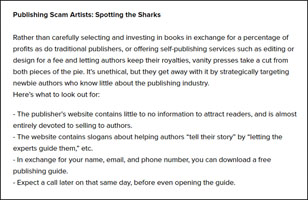
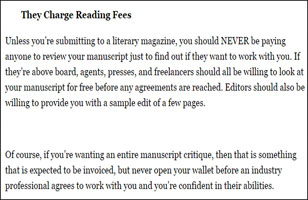
Warning for authors:
Authors need to be very careful while choosing the publishing companies. If the author comes to contractual terms with a fake publishing company, the author looses his/her piece of writing. Scammers contractually bind you to the terms and conditions of their company that are only beneficial to them. Authors need to verify the company of its goodwill and then take a step further to publish their writing with them.
Examples of publishing scams:
In spite of continuous awareness being spread about book publishing scams, there are still companies that are making money from these victims who fall prey to publishing scams. Below is an example where a book publishing house was investigated of scam. The entire process appeared to be so legitimate that any publisher would believe the same. In the end the publishing house demanded what is called as the "small publishing fee" that would be required to publish the writing. Innocent users who are unaware of these tricks used by scammers often tend to believe them.
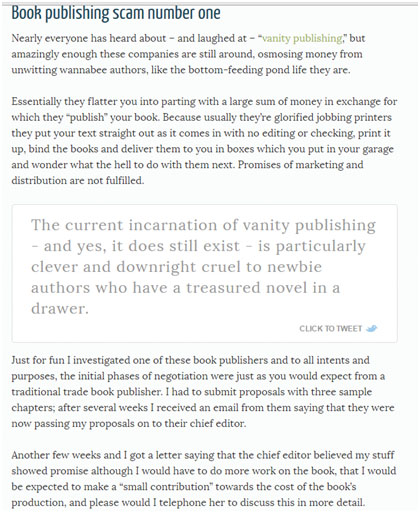
Mentioned below is another example of book publishing scam. The screenshot talks about Fairy Godmother book coach, a well known publishing house that assists you in book publishing services. They charge you for every single service that they do ranging from correcting the grammar to exchanging the emails, phone calls and so on. All the publishers need to beware of these publishing hoaxes that are functioning around with great pride.
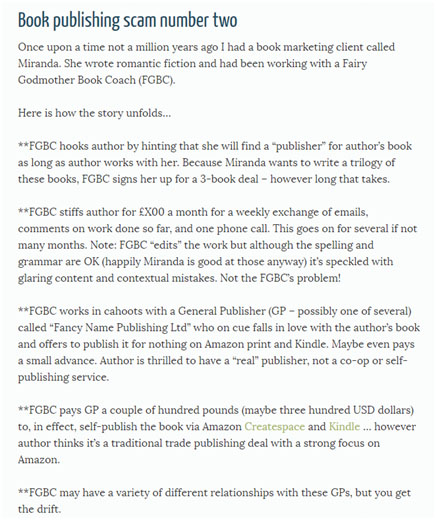
Many self publishers are entering into what is popularly known as the "best seller publishing scam". Amazon lists bestselling books that are blinded purchased by people all over the world assuming it to be the best quality. But many self publishers and fake publishing houses trick Amazon and get their books listed in the best selling section. Publishers charge a nominal fee from the author claiming to get their book listed in the best selling section in Amazon.
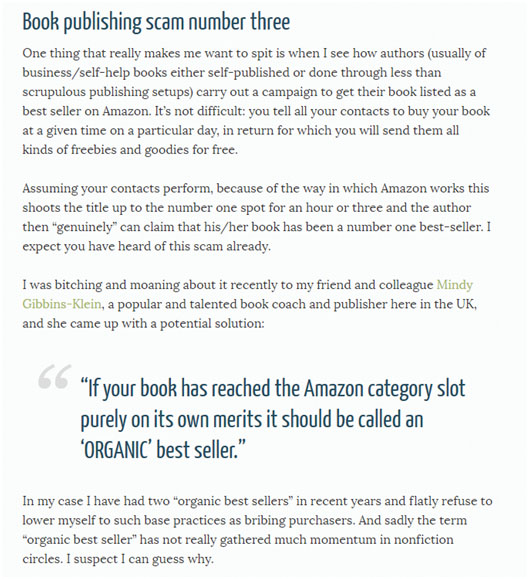
The huge book publishing scandal in South Korea:
A huge shocking number of 179 professors from about 110 universities are facing a criminal offense of plagiarism. What these professors did is a huge shock for anybody. The whole group of scammers copy pasted the entire text books written by authors previously and sold them with newly designed covers. Some text books had minor changes done just to avoid getting caught, while others were found to be a replica of the old text books. Some of the old authors were also a part of this scandal, as they were promised small share in the profit that was made.
These plagiarized text books were sold to the students outside the campus. It is also noted that four publishing companies were a part of this scam that helped the bogus professors re publish old books with new covers. Strict action was taken against the 179 professors and 5 employees of the publishing house who were involved in this huge publishing scam.
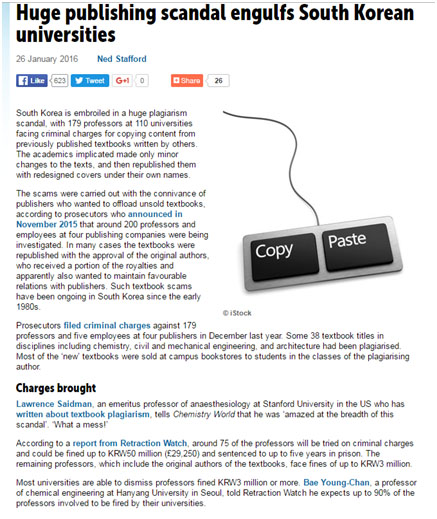
Related Scams:
Telstra Scams Telstra internet infrastructure service is warning users of Telstra services about the Telstra scam that is gaining popularity.
Read More...
Time Share Scam
Timeshare properties are promoted and looked after by the companies that are selling them to different buyers. Tele-callers or few Read More...
Transport Scam
Auto transport has a high turnover rate, with numerous organizations coming up short after the first year in which ,Read More...
Travel Scams These scams deal with paying the workers with minimum wage or travel cost than they deserve. For instance, if the
Read More...
Travel Prize Scam Travel prize scams are attempts to trick you into parting with your money to claim a 'reward' such as a free or discounted holiday....
Read More...













